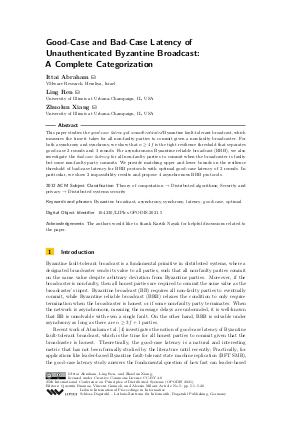Good-Case and Bad-Case Latency of Unauthenticated Byzantine Broadcast: A Complete Categorization
Authors Ittai Abraham, Ling Ren, Zhuolun Xiang
-
Part of:
Volume:
25th International Conference on Principles of Distributed Systems (OPODIS 2021)
Part of: Series: Leibniz International Proceedings in Informatics (LIPIcs)
Part of: Conference: International Conference on Principles of Distributed Systems (OPODIS) - License:
 Creative Commons Attribution 4.0 International license
Creative Commons Attribution 4.0 International license
- Publication Date: 2022-02-28
File

PDF
LIPIcs.OPODIS.2021.5.pdf
- Filesize: 0.73 MB
- 20 pages
Document Identifiers
Subject Classification
ACM Subject Classification
- Theory of computation → Distributed algorithms
- Security and privacy → Distributed systems security
Keywords
- Byzantine broadcast
- asynchrony
- synchrony
- latency
- good-case
- optimal
Metrics
- Access Statistics
-
Total Accesses (updated on a weekly basis)
0PDF Downloads0Metadata Views
Abstract
This paper studies the good-case latency of unauthenticated Byzantine fault-tolerant broadcast, which measures the time it takes for all non-faulty parties to commit given a non-faulty broadcaster. For both asynchrony and synchrony, we show that n ≥ 4f is the tight resilience threshold that separates good-case 2 rounds and 3 rounds. For asynchronous Byzantine reliable broadcast (BRB), we also investigate the bad-case latency for all non-faulty parties to commit when the broadcaster is faulty but some non-faulty party commits. We provide matching upper and lower bounds on the resilience threshold of bad-case latency for BRB protocols with optimal good-case latency of 2 rounds. In particular, we show 2 impossibility results and propose 4 asynchronous BRB protocols.
Cite As Get BibTex
Ittai Abraham, Ling Ren, and Zhuolun Xiang. Good-Case and Bad-Case Latency of Unauthenticated Byzantine Broadcast: A Complete Categorization. In 25th International Conference on Principles of Distributed Systems (OPODIS 2021). Leibniz International Proceedings in Informatics (LIPIcs), Volume 217, pp. 5:1-5:20, Schloss Dagstuhl – Leibniz-Zentrum für Informatik (2022)
https://doi.org/10.4230/LIPIcs.OPODIS.2021.5
BibTex
@InProceedings{abraham_et_al:LIPIcs.OPODIS.2021.5,
author = {Abraham, Ittai and Ren, Ling and Xiang, Zhuolun},
title = {{Good-Case and Bad-Case Latency of Unauthenticated Byzantine Broadcast: A Complete Categorization}},
booktitle = {25th International Conference on Principles of Distributed Systems (OPODIS 2021)},
pages = {5:1--5:20},
series = {Leibniz International Proceedings in Informatics (LIPIcs)},
ISBN = {978-3-95977-219-8},
ISSN = {1868-8969},
year = {2022},
volume = {217},
editor = {Bramas, Quentin and Gramoli, Vincent and Milani, Alessia},
publisher = {Schloss Dagstuhl -- Leibniz-Zentrum f{\"u}r Informatik},
address = {Dagstuhl, Germany},
URL = {https://drops.dagstuhl.de/entities/document/10.4230/LIPIcs.OPODIS.2021.5},
URN = {urn:nbn:de:0030-drops-157806},
doi = {10.4230/LIPIcs.OPODIS.2021.5},
annote = {Keywords: Byzantine broadcast, asynchrony, synchrony, latency, good-case, optimal}
}
Author Details
Acknowledgements
The authors would like to thank Kartik Nayak for helpful discussions related to the paper.
References
-
Ittai Abraham, Srinivas Devadas, Danny Dolev, Kartik Nayak, and Ling Ren. Synchronous byzantine agreement with expected O(1) rounds, expected O(n²) communication, and optimal resilience. In International Conference on Financial Cryptography and Data Security (FC), pages 320-334. Springer, 2019.

-
Ittai Abraham, Dahlia Malkhi, Kartik Nayak, Ling Ren, and Maofan Yin. Sync hotstuff: Simple and practical synchronous state machine replication. IEEE Symposium on Security and Privacy (SP), 2020.

-
Ittai Abraham, Kartik Nayak, Ling Ren, and Zhuolun Xiang. Brief announcement: Byzantine agreement, broadcast and state machine replication with optimal good-case latency. In 34th International Symposium on Distributed Computing (DISC), 2020.

-
Ittai Abraham, Kartik Nayak, Ling Ren, and Zhuolun Xiang. Good-case latency of byzantine broadcast: A complete categorization. In Proceedings of the third annual ACM Symposium on Principles of Distributed Computing (PODC), pages 331-341, 2021.

-
Gabriel Bracha. Asynchronous byzantine agreement protocols. Information and Computation, 75(2):130-143, 1987.

-
Ran Canetti and Tal Rabin. Fast asynchronous byzantine agreement with optimal resilience. In Proceedings of the twenty-fifth annual ACM symposium on Theory of computing (STOC), pages 42-51, 1993.

-
Danny Dolev, Joseph Y Halpern, Barbara Simons, and Ray Strong. Dynamic fault-tolerant clock synchronization. Journal of the ACM (JACM), 42(1):143-185, 1995.

-
Danny Dolev and Rüdiger Reischuk. Bounds on information exchange for byzantine agreement. Journal of the ACM (JACM), 32(1):191-204, 1985.

-
Danny Dolev, Ruediger Reischuk, and H Raymond Strong. Early stopping in byzantine agreement. Journal of the ACM (JACM), 37(4):720-741, 1990.

-
Danny Dolev and H. Raymond Strong. Authenticated algorithms for byzantine agreement. SIAM Journal on Computing, 12(4):656-666, 1983.

-
Michael J Fischer and Nancy A Lynch. A lower bound for the time to assure interactive consistency. Information Processing Letters, 14(4):183-186, 1982.

-
Damien Imbs and Michel Raynal. Trading off t-resilience for efficiency in asynchronous byzantine reliable broadcast. Parallel Processing Letters, 26(04):1650017, 2016.

-
Leslie Lamport, Robert Shostak, and Marshall Pease. The byzantine generals problem. ACM Transactions on Programming Languages and Systems, 4(3):382-401, 1982.

